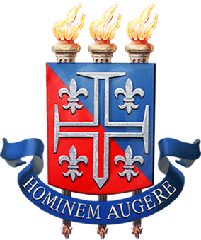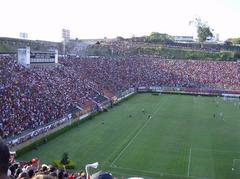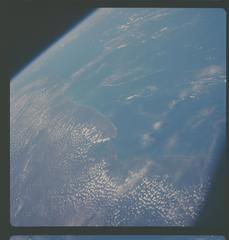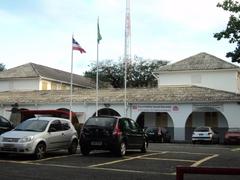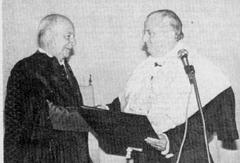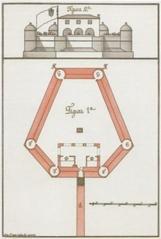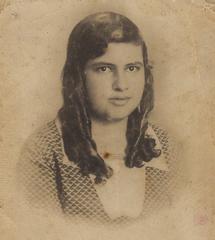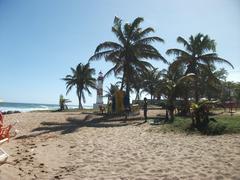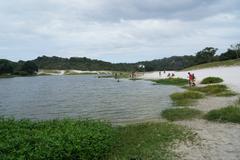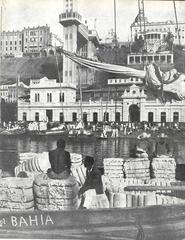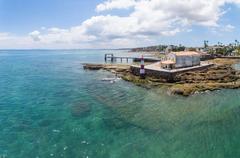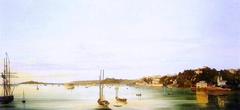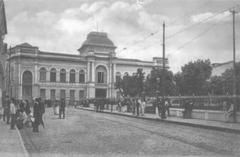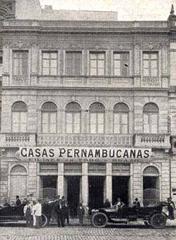Polytechnic School of the Federal University of Bahia: Visitor Guide, Tickets, and Historical Insights
Date: 15/06/2025
Introduction
Located in the heart of Salvador, Bahia, the Polytechnic School of the Federal University of Bahia (Escola Politécnica da Universidade Federal da Bahia, or POLI-UFBA) is not just a prestigious academic institution but also a living monument to Brazil’s engineering legacy. Established in 1897, POLI-UFBA stands as one of the oldest engineering schools in Brazil and has played an instrumental role in shaping national infrastructure, education, and technological advancements. Its campus, blending neoclassical and modernist architecture, offers an immersive experience for history enthusiasts, prospective students, and cultural explorers alike.
This comprehensive guide details everything you need to plan your visit, including historical background, visiting hours, admission policies, guided tours, accessibility, practical tips, and recommendations for nearby attractions that showcase the broader cultural tapestry of Salvador.
For further details, refer to the POLI-UFBA Official Website and Salvador’s cultural heritage resources (Bahia.ws History of Salvador).
Table of Contents
- Historical Overview
- Visitor Information
- Campus Highlights
- Practical Tips & Nearby Attractions
- FAQ
- Conclusion & Call to Action
- References
Historical Overview
Founding and Early Development
Established in 1897, POLI-UFBA emerged during a period of significant educational growth in Bahia, reflecting the region’s ambition to become a center of scientific and technological progress. The school was founded to meet Brazil’s demand for skilled engineers as the country entered a period of rapid industrialization.
Integration into UFBA
In 1946, POLI-UFBA became a founding unit of the Federal University of Bahia (UFBA), the state’s premier public university. This integration facilitated greater academic collaboration, expanded resources, and enhanced opportunities for students, positioning the Polytechnic School at the forefront of engineering education in Brazil.
Academic Evolution and Architectural Heritage
POLI-UFBA offers comprehensive programs in civil, electrical, mechanical, chemical, and environmental engineering. Its alumni have contributed to landmark projects such as the construction of Brasília and the development of major hydroelectric plants. Architecturally, the campus presents a harmonious blend of neoclassical and modernist styles, with the historic main building standing as a testament to early 20th-century design.
Visitor Information
Visiting Hours & Admission
- General Campus Access: Monday to Friday, 8:00 AM to 6:00 PM.
- Monument and Memorial Access: Monday to Friday, 9:00 AM to 5:00 PM.
- Admission: Entry to the campus and most public areas is free. Some laboratories or exhibitions may require advance registration.
- Weekend Visits: Available by appointment only.
Guided Tours & Events
- Guided Tours: Available on weekdays at 11:00 AM and 3:00 PM. Advance booking via the UFBA website or administrative office is recommended.
- Special Events: The school hosts periodic academic festivals, public lectures, and exhibitions. Check the school’s website for an updated calendar (LinkedIn BRICS+ Summer School).
Accessibility & Facilities
- Physical Accessibility: The campus is equipped with ramps, elevators, and accessible restrooms. Some older structures may have limited accessibility; contact administration if special accommodations are needed.
- Amenities: Cafeterias, snack bars, restrooms, and guest Wi-Fi (available upon request at reception) enhance visitor comfort.
Campus Highlights
Architectural Features
- Main Building: A neoclassical landmark featuring arched windows, ornate details, and symmetrical facades. Symbolic of the school’s engineering heritage (Wikipedia).
- Modern Academic Blocks: Sleek, functional structures with open interiors supporting lectures, labs, and collaborative research.
- Memorial Arlindo Coelho Fragoso: Dedicated to the school’s founders and engineering legacy, this memorial houses archival documents, photographs, and artifacts.
- Laboratories & Libraries: Equipped with state-of-the-art technology, these facilities are sometimes open for tours during academic events.
Memorials & Museums
- Memorial Arlindo Coelho Fragoso: Explore Bahia’s engineering history through curated exhibits and historical records.
- Nearby Museums: The Museu Afro-Brasileiro and Museu de Arte Sacra are within easy reach and offer deeper insight into Salvador’s cultural heritage.
Art & Green Spaces
- Campus Art: Murals and installations by local artists celebrate Salvador’s Afro-Brazilian heritage and the intersection of technology and culture.
- Gardens & Courtyards: Shaded lawns and outdoor seating areas provide tranquil spaces for relaxation and cultural events.
Practical Tips & Nearby Attractions
-
Plan Ahead: Book guided tours and check event schedules in advance.
-
Transportation: Reach POLI-UFBA via public buses (routes to “Federação” or “UFBA”), taxis, or ride-sharing services. On-site parking is limited; public transit is recommended.
-
Combine Visits: POLI-UFBA is close to Salvador’s major attractions:
- Pelourinho: A UNESCO World Heritage Site known for colonial architecture and vibrant street life (Bahia.ws).
- Museu Afro-Brasileiro: Showcases Afro-Brazilian contributions to the region (Bahia.ws).
- Church of Nosso Senhor do Bonfim: Salvador’s iconic religious site.
- Beaches: Porto da Barra and Farol da Barra offer relaxing escapes nearby.
-
Best Times to Visit: April to September offers pleasant weather. Academic semesters (March–July, August–December) provide opportunities to experience campus life (Travellers Worldwide).
-
Safety & Etiquette: Use official taxis, keep valuables secure, and follow campus guidelines. Comfortable attire is recommended.
FAQ
Q: Is there an entry fee?
A: No, admission to the campus and monument is free.
Q: Are guided tours available?
A: Yes, guided tours are offered on weekdays at set times; advance booking is recommended.
Q: Is the campus accessible for visitors with disabilities?
A: Yes, main facilities are wheelchair accessible; contact administration for specific needs.
Q: Can I take photos on campus?
A: Photography is permitted in public areas; restrictions may apply in certain indoor spaces.
Q: Are there dining options on campus?
A: Yes, several cafeterias and snack bars are available.
Q: What is the best way to get to POLI-UFBA?
A: Public transit and taxis are most convenient; limited parking is available for cars.
Conclusion & Call to Action
The Polytechnic School of the Federal University of Bahia stands as a beacon of education, innovation, and cultural heritage in Salvador. Its picturesque campus, rich history, and central location make it an essential destination for anyone interested in Brazil’s academic and architectural legacy. Whether you’re planning a focused academic visit or exploring Salvador’s broader attractions, POLI-UFBA offers a unique and enriching experience.
For up-to-date visitor information, guided tour bookings, and cultural event schedules, visit the UFBA official site or download the Audiala app for curated tours and insider tips. Enhance your journey by exploring nearby historical districts, museums, and beaches, making your visit to Salvador truly unforgettable.
References
- POLI-UFBA Official Website
- Federal University of Bahia (UFBA) Visitor Information
- History of the Polytechnic School (Wikipedia)
- UFBA Official Site
- History of Salvador - Bahia.ws
- Bahia Tourist Guide
- Travellers Worldwide: Best Time to Visit Brazil
- ISPRS Proceedings: Architectural Heritage
- BRICS+ Salvador Summer School (LinkedIn)

